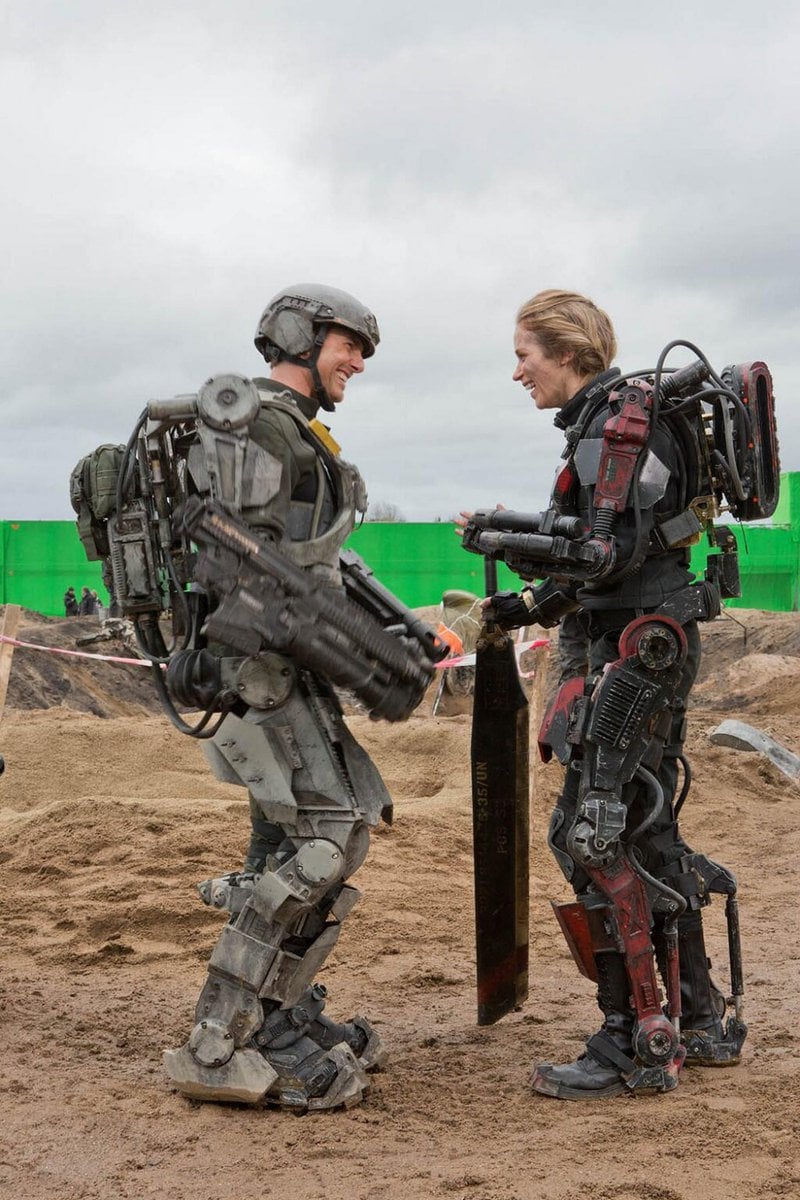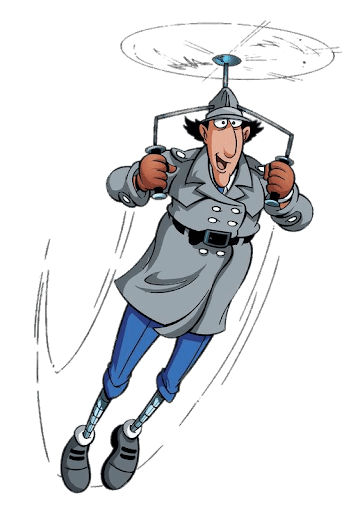Just detach the blades. You can always re-attach them when you’ve landed.
Works as a secret weapon too.
Oh you think I’ve been disarmed? *smirks* AMATEUR *violently ejects rotor blades in all directions*

What is this from? Looks pretty cool
Edge of Tomorrow. Fun movie.
Great for fans of Tom Cruise because he’s in it.
Great for people who hate Tom Cruise because you get to see him die over and over again!
The angle of the top of his feet/boots remind me of the Ron DeSantis boot thing - where he’s actually using a platform type setup to gain height.
I was just thinking the entire rotor assembly detaches and the helocopter falls away from it. But I think I like your idea better.
For ejection, the blades come off.
For combat, whole-rotor Beyblade.
That’s what the Ka-50 does
I love jigsaw puzzles.
I doubt you’ll need to if you already had to eject.
Hear me out:
Seats that drop out of the bottom of the helicopter
That way, the pilots can get to the ground first and cushion the impact of the helo 👌
Just do a barrel roll while ejecting so you shoot up. Try not to hit your wingman with your copilot tho
F-104 did it first!
Did it work? Like are the test subjects still alive lol that sounds like rear decapitation city
I think the main problem with down-firing ejector seats was that they require a minimum altitude to work.
https://aviation.stackexchange.com/questions/1439/is-there-a-minimum-altitude-for-ejection-seats
I’m gonna turn to YouTube to see what I can find. This is pretty cool. Cars should have ejector seats too.
They’d definitely have a minimum altitude to work
“And what’s the minimum altitude?”
“Uh, one, I suppose.”
What about sideways?
I think they did it in a fast and furious movie, I’m not sure if that’s up to NCD standards.
Some Russian helicopters do this
How many of those are intentional?
Attach the ejector seat TO the helicopter blades so that they both eject and you get a cool propeller and can fly around and it can shoot lasers and stuff too.
Just eject the damaged parts. Viola
Who brings a damaged viola to a warzone?
playing with legos be like
I’ll get you next time, Gadget!
Eject the helicopter not the seat. Duh.
Shoot the hostage!
Too hard to accelerate the helicopter’s larger mass to Mach 19. You might still damage the helicopter on the rotor blades.
So basing off another comment. Have the Ejection seat tied to the rotor and shaft (not in a way that the chair spins. Duh)
Then (as long as rotor hasn’t disintegrated) you can eject the seat with the rotor, thus minimizing filet chances… Whilst also floating to the ground softly like those whirly paper helicopter things you played with as a kid
Boom. Parachute free ejection seat
Hold up, let him cook

Nah, just do it like they did in WW1; synchronize the ejection to the rotor blades so you fly through the gap, clean as a whistle.
(Please don’t ask about our experiments with the earlier WW1 method of “Fuck it, just shoot the propeller sometimes, it’ll be fine”. Turns out that doesn’t work so great when you replace bullets with people.)
Didn’t they also put some sort of armoring on the propellers back then?
Some planes did, but early on they mostly just freeballed it. Turns out propellers are really big and heavy, and they can take a few bullets without breaking. Armour actually makes it more likely that fragments of bullets will fly back at the pilot.
Yeah, spall was my first thought when I read they just shot the propellers.
It’s very rare that a bullet strikes the blade anyway. Bursts were short because ammo was very limited (twenty round strips were common in early biplanes), and the percentage of the space in front of the nose that is propeller is absolutely tiny compare to the percentage that is not propeller. To us its all a blur but to a bullet those blades are basically standing still.
Now this is the kinda content I subscribe to
Fire the seat forward toward the enemy aircraft that forced them to eject to allow them to steal it.
deleted by creator
Oh boy I love it when death is multiple choice!
- Fiery explosion
- Cuisinart of Doom
- Squeezing your brain into hips
- 9mm of lead therapy
- Other: __________
Sus. I watched AirWolf, and Magnum P.I. AND I’ve studied Leonardo di Vinci. Helicopters are next-gen tech and they don’t crash.
Ironically the helicopter casted as Airwolf did crash, killing all its occupants. 😞
Yeah that sucks, I didn’t mean to go there
Why not blow the blades off first with a charge in the Jesus pin? Or have the seats eject siddeways or downward? Or like, open the door and jump out hoping you don’t hit he rotors?
If you eject downward you may hit the ground before your chute has opened. Helicopters tend to stay pretty low.
Can’t believe I had to scroll this far to find the real solution. Eject rotors, then eject pilots. I think fighter jets basically do the same: eject canopy, then seat.
Because now you have blades shooting away from the helicopter at a high speed which could kill someone.
I think i heard one time that helicopters can jettison the rotor so you dont get chopped up
Unfortunately, that won’t stop the blades from spinning, meaning the danger isn’t averted.
You shear the blades so they shoot outwards. I couldn’t find an irl testing video, but here’s a render.
Mainly just copium for the pilots. Helicopters aren’t like airplanes where you have glide time and altitude to decide what to do after something bad happens. If you watch fixed winged ejections there’s usually about 30 seconds to a min after something goes wrong before the pilot decides to bail. Helicopters go from everything being fine, to a debris field in seconds.
It’s more about altitude than the ability to glide. Helicopters can do what’s called Auto rotation, which means they actually can glide. If the blade seize up however, they can’t autorotate. Helicopters fly a lot lower than most airplanes though, so they can’t glide as far.
Autorotation is mostly copium as well.
Wow. I’d be nuts to fly one of those things. 6000 VVI sounds like suicide
With the collective firmly held down on the bottom stop, things happen very fast. The helicopter is descending in a hurry, as in 4,000 – 6,000 feet per minute. Do the math, if you are at 1,000 feet and the descent rate is 4,000 feet, you have one quarter or a minute – 15 seconds – to find a place to land.
Yeah, helicopters are the apex predators of soldiers and rich people. Even if you pull off the perfect autorotation, the glide ratio is still only a maximum of like 3:1.
I think I remember reading a report somewhere that more people have been killed by practicing autorotation than have actually pulled it off in the wild.
Now you have blades shooting away from the helicopter at a high speed which could kill someone.
The Kamov does it.
The individual rotor blades are separated from the center with an explosive charge and their centrifugal motion carries them laterally away from the vehicle as the seat rockets straight up.
As a bonus, whoever was close enough to shoot you down is about to get at least one heavy steel javelin flung terrifyingly close to their direction at high speeds.
I’m assuming here that impact with a long range SAM is probably something you’re not about to eject from.
In cases like that I’d imagine you’d try and eject prior to being hit, though I don’t know enough to know how much warning time there is.
not much, considering how many of Ka-52s were shot down without pilots ejecting
Pretty sure someone was lying to ya
Several models of helicopters have ejectable blades, this article mentions a few, and has a diagram of the blade severing system.
Damn never would have expected that. Thanks for showing me something new!
Who would win?
Two human skulls 💀💀
One twirly boi 🚁
Put some ERA on them skulls and you’re good
I think it’s the Apache helicopter that stops the rotors instantly on eject. No need for Mach 13. I know this graphic is a joke though, I just remembered this cool thing about the helicopter.
It’s the KA-50/52
I like all the serious answers as if this was a real option.
Very credible
Why not extend the seat sideway and eject that way?
I don’t know of any ejection seats that go sideways, but early F-104 models had a downward track ejection seat. The main issue is that parachutes need some time to open and helicopters tend to fly pretty low. So in most situations you wouldn’t be in a safe altitude to actually eject.
Modern zero-zero seats can safely eject at any altitude, but they do so by using a rocket motor to fly upwards to a safe altitude for the parachute to open. So because of the rotors, helicopters generally don’t have ejection seats. The exception is the Kamov KA-50 series. It has explosive bolts blowing off the rotors before ejection.
Presumably less “blowing off” and more “letting go.” They’re already being spun with as much centripetal force as they’ll tolerate. The explosive only needs enough oomph to make itself disappear.
Which had to be a weird pitch. Like, ‘for safety reasons, we’re going to stitch this together with detcord.’
















